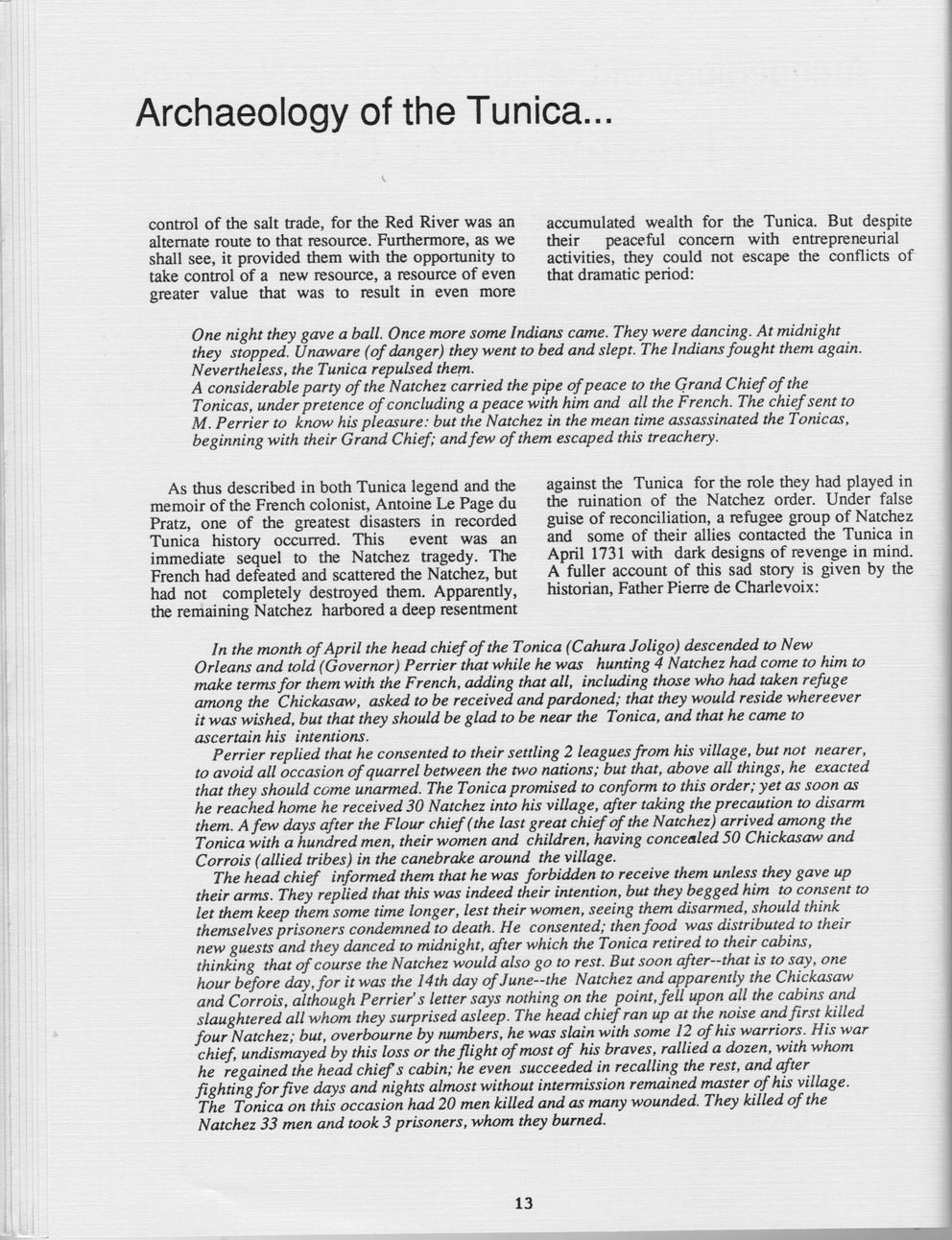This text was obtained via automated optical character recognition.
It has not been edited and may therefore contain several errors.
Archaeology of the Tunica... control of the salt trade, for the Red River was an alternate route to that resource. Furthermore, as we shall see, it provided them with the opportunity to take control of a new resource, a resource of even greater value that was to result in even more accumulated wealth for the Tunica. But despite their peaceful concern with entrepreneurial activities, they could not escape the conflicts of that dramatic period: One night they gave a ball. Once more some Indians came. They were dancing. At midnight they stopped. Unaware (of danger) they went to bed and slept. The Indians fought them again. Nevertheless, the Tunica repulsed them. A considerable party of the Natchez carried the pipe of peace to the Grand Chief of the Tonicas, under pretence of concluding a peace with him and all the French. The chief sent to M. Perrier to know his pleasure: but the Natchez in the mean time assassinated the Tonicas, beginning with their Grand Chief; and few of them escaped this treachery. As thus described in both Tunica legend and the memoir of the French colonist, Antoine Le Page du Pratz, one of the greatest disasters in recorded Tunica history occurred. This event was an immediate sequel to the Natchez tragedy. The French had defeated and scattered the Natchez, but had not completely destroyed them. Apparently, the remaining Natchez harbored a deep resentment against the Tunica for the role they had played in the ruination of the Natchez order. Under false guise of reconciliation, a refugee group of Natchez and some of their allies contacted the Tunica in April 1731 with dark designs of revenge in mind. A fuller account of this sad story is given by the historian, Father Pierre de Charlevoix: In the month of April the head chief of the Tonica (Cahura Joligo) descended to New Orleans and told (Governor) Perrier that while he was hunting 4 Natchez had come to him to make terms for them with the French, adding that all, including those who had taken refuge among the Chickasaw, asked to be received and pardoned; that they would reside whereever it was wished, but that they should be glad to be near the Tonica, and that he came to ascertain his intentions. Perrier replied that he consented to their settling 2 leagues from his village, but not nearer, to avoid all occasion of quarrel between the two nations; but that, above all things, he exacted that they should come unarmed. The Tonica promised to conform to this order; yet as soon as he reached home he received 30 Natchez into his village, after taking the precaution to disarm them. A few days after the Flour chief (the last great chief of the Natchez) arrived among the Tonica with a hundred men, their women and children, having concealed 50 Chickasaw and Corrois (allied tribes) in the canebrake around the village. The head chief informed them that he was forbidden to receive them unless they gave up their arms. They replied that this was indeed their intention, but they begged him to consent to let them keep them some time longer, lest their women, seeing them disarmed, should think themselves prisoners condemned to death. He consented; then food was distributed to their new guests and they danced to midnight, after which the Tonica retired to their cabins, thinking that of course the Natchez would also go to rest. But soon after—that is to say, one hour before day, for it was the 14th day of June—the Natchez and apparently the Chickasaw and Corrois, although Perrier’s letter says nothing on the point, fell upon all the cabins and slaughtered all whom they surprised asleep. The head chief ran up at the noise and first killed four Natchez; but, overbourne by numbers, he was slain with some 12 of his warriors. His war chief, undismayed by this loss or the flight of most of his braves, rallied a dozen, with whom he regained the head chiefs cabin; he even succeeded in recalling the rest, and after fighting for five days and nights almost without intermission remained master of his village. The Tonica on this occasion had 20 men killed and as many wounded. They killed of the Natchez 33 men and took 3 prisoners, whom they burned. 13

Native Americans The-Tunica-Biloxi-Tribe-its-Culture-and-People-(20)